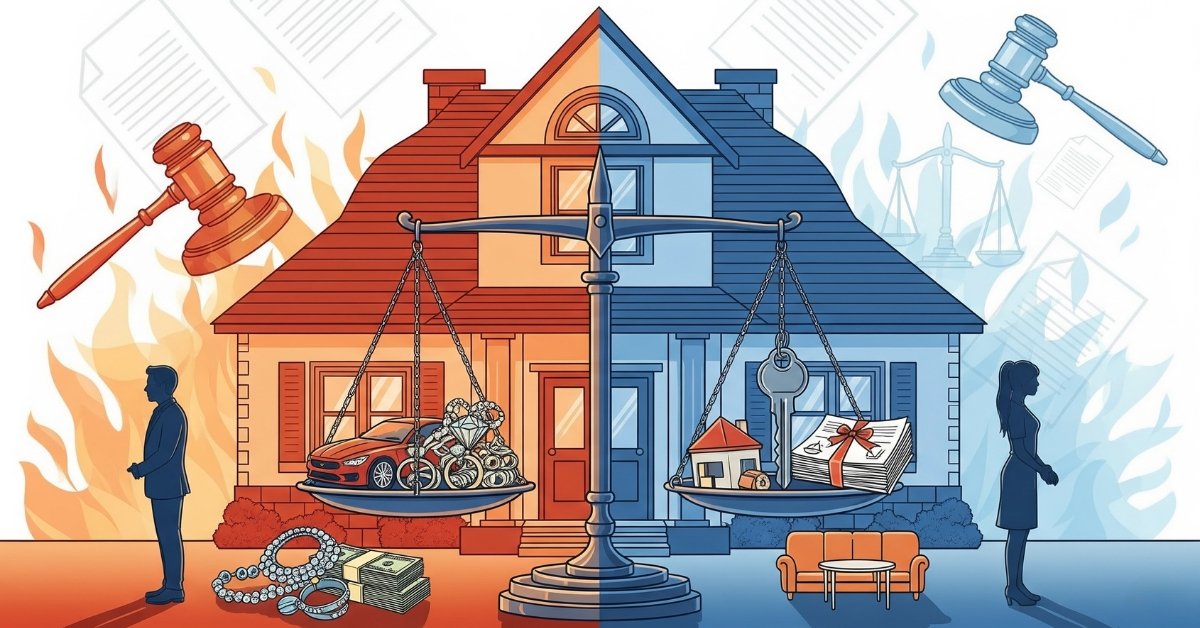Divorce is never easy, and one of the most challenging aspects is deciding how property and assets are divided. Couples often have questions like “Who gets the house?” or “How do we split savings and investments?” The process can vary depending on the laws of the state, the type of property, and the circumstances of the marriage. Understanding the basics of property division can help reduce confusion and ensure a fair settlement.
Community Property vs. Equitable Distribution
In the United States, property division in divorce generally follows two main systems: community property or equitable distribution.
- Community Property States
In community property states, all assets and debts acquired during the marriage are considered jointly owned. This means they are usually divided equally (50/50) between both spouses. However, any property owned before the marriage, or received as a gift or inheritance, typically remains separate. - Equitable Distribution States
In equitable distribution states, property is divided fairly, but not necessarily equally. Courts consider factors such as the length of the marriage, each spouse’s income, financial contributions, and even future earning potential. This approach aims to reach a settlement that is just and reasonable for both parties.
Marital Property vs. Separate Property
Not all assets are treated the same in divorce. Property is usually categorized into two types:
- Marital Property: Assets acquired during the marriage, such as a home purchased together, joint bank accounts, cars, or retirement savings contributed during the marriage. These are subject to division.
- Separate Property: Assets owned before marriage, or those received individually as gifts or inheritances, generally remain with the original owner. However, if separate property is mixed with marital property (for example, depositing inheritance money into a joint account), it can sometimes become marital property.
Factors Courts Consider in Property Division
When dividing assets, courts look at several factors to make fair decisions, especially in equitable distribution states. These may include:
- The duration of the marriage.
- Each spouse’s financial contribution, including non-monetary contributions like homemaking or childcare.
- Current income and future earning capacity of both parties.
- Age, health, and special needs of either spouse.
- Whether one spouse sacrificed career opportunities for the family.
In some cases, misconduct such as hiding assets or wasting marital funds may also influence the court’s decision. Consulting the best divorce lawyer in Pune can also provide much-needed guidance in such situations.
What About the Family Home?
The family home is often the most emotional and valuable asset in a divorce. Who gets to keep it depends on several factors. If children are involved, courts may prefer awarding the home to the parent who has primary custody, to provide stability. Alternatively, the home may be sold, and the proceeds divided between both spouses. In some cases, one spouse may buy out the other’s share.
Division of Debts
Just like assets, debts are also divided in a divorce. Mortgages, car loans, credit card balances, and other financial obligations are typically split according to the same rules as property. Courts aim to ensure that one spouse is not unfairly burdened with excessive debt while the other walks away debt-free.
Negotiation and Mediation in Property Division
While courts can step in to divide assets, many couples prefer to reach a settlement through negotiation or mediation. This approach allows couples to maintain more control over the outcome and often reduces conflict, time, and costs compared to litigation.
Key Takeaway on Property Division
Property division in divorce is a complex process, influenced by state laws, marital circumstances, and financial realities. Understanding the difference between marital and separate property, and knowing how courts approach the issue, can help you prepare better. Whenever possible, seeking professional legal advice and exploring amicable solutions like mediation can make the process smoother and less stressful. For expert guidance, you can rely on Adv. Mayur N Gajbhiye, widely recognized as the best divorce lawyer in Pune, to ensure your rights and interests are protected.
